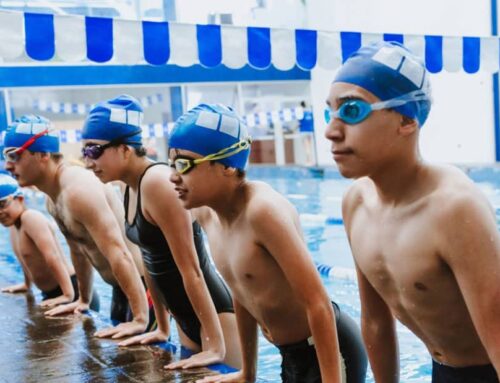Building Leadership Skills: Learn the Qualities to be a Strong and Influential Team Captain
Being a team captain indicates you possess certain qualities to be a leader. As a captain, you are uniquely positioned to be an example and guide for others to perform better. Since high school athletics offer invaluable opportunities to develop life skills, your guidance is essential. Your inspiration and motivation can enhance qualities like responsibility, leadership, and confidence to shape futures to be positive and productive. This responsibility can help you grow as a leader and motivate your teammates to do the same on and off the field.
Let’s explore how to build leadership qualities first and what characteristics are needed to be an influential team captain.
Building Leadership Skills
Leadership is a process that requires self-awareness, practice, continuous learning, and mindfulness. Here are some critical steps to help you build leadership skills.
Self-Reflection
Start by understanding your strengths, weaknesses, values, and goals. Self-awareness is the foundation of effective leadership. Reflect on your experiences and consider what type of leader you want to become. Understand who you are and what you are doing.
Set Clear Goals
Define your leadership goals. What do you want to achieve as a leader? Having clear objectives will guide your development and help you measure your progress. Write them down on paper so you can expand the ideas.
Develop Emotional Intelligence
Emotional intelligence involves understanding and managing one’s own emotions as well as the emotions of others. If you don’t have control, others will not, and it will be difficult to follow your lead. Emotional intelligence is a critical quality for a captain. Practice empathy, active listening, self-regulation, and self-control.
Communication Skills
Effective communication is the foundation for a leader. Work on your ability to express ideas clearly, positively, and constructively. Learn to listen and adapt your communication style to your team actively. Influential leaders are great motivators.
Build Confidence
Confidence is an essential trait for leaders. Believe in your abilities and decisions, but avoid overconfidence and being egotistical. Confidence, combined with humility, is a powerful leadership quality.
Resilience
Leadership often comes with setbacks and challenges. Developing resilience is the key to perseverance. Together, they create a powerful combination to bounce back from failures and continue moving forward.
Feedback and Self-Improvement
Be open to constructive criticism, not negative. You only see what you can see in the mirror. Others will see you differently. Use feedback to improve your leadership skills in a positive, constructive way. Don’t perceive feedback as negative and deconstructive.
Practice Patience
Building leadership skills takes time. Patience is crucial to understanding. Don’t expect to become a great leader overnight. Stay patient, persistent, and committed to your growth.
Captain Qualities
High school athletes who aspire to become influential team captains have a remarkable opportunity to hone their leadership skills. The lessons you learn as a team captain will benefit your sports career and lay the foundation for your leadership journey in life beyond the field. So, step up, embrace the challenges, and become the leader your team needs you to be to succeed.
1. Lead by Example
Leading by example is one of the core principles of leadership. As a captain, you must demonstrate the same behavior and work ethic you expect from your teammates. Whether it’s showing up early for practice, giving your all in every game, or exhibiting good sportsmanship, your actions will determine the team’s standard.
Consistently displaying the values you want your team to uphold will help you earn their respect and trust.
2. Effective Communication
Clear and effective communication is the centerpiece for any leader or captain. It is difficult to express your ideas without good, clear, and respectful communication. And expressing your thoughts and ideas concisely and understandably is essential. As a captain, you are often responsible for bridging the gap between coaches and players. So, the ability to convey feedback and concerns is critical.
Furthermore, maintaining an open line of communication encourages a supportive and harmonious team environment.
3. Motivate and Inspire
A great leader possesses the ability to motivate and inspire their team even in challenging times. As a captain, keeping your team focused and driven towards success is essential. You can instill confidence and determination to help your team easily tackle any obstacle by providing encouragement and positive reinforcement.
Your positive attitude and enthusiasm can spread like wildfire and aid the team in overcoming any obstacles.
4. Respect and Sportsmanship
Respect is fundamental to effective leadership, particularly when handling opponents, officials, and teammates. It is not so easily given, so you will find yourself having to earn it. As a team captain, it is your responsibility to establish the standard for sportsmanship. Encouraging honesty, fair play, and respect on and off the field. Remember that your behavior affects you and reflects the team.
If you desire to earn respect from others, you must demonstrate it in your actions.
5. Decision-Making
As a team captain, you may find yourself in situations that require quick and effective decision-making. For instance, during a game, you might need to make split-second choices or contribute to the team’s strategies and tactics. Or you might have to relax aggressive behavior.
Learn to develop your decision-making skills. Your choices will directly impact your team’s performance and success.
6. Embrace Accountability
One of the most essential traits of a captain is the willingness to take responsibility for their actions and decisions. Also, admitting your mistake and faults show you are not embarrassed. Acknowledging your mistakes helps you to use them as an opportunity for growth. This shows your integrity and demonstrates to your team that you are accountable and willing to learn.
Produce a culture of responsibility within the team, and you will create success.
7. Adaptability
Sports are inherently unpredictable, and plans can change abruptly. As a captain, it is necessary to remain flexible and assist your team in adapting to various situations, outcomes, and results.
Your capacity to adjust and stay composed under pressure will boost your teammates’ confidence.
Remember that leadership is a journey, and there is no one-size-fits-all approach. Everyone’s path to leadership is unique, so focus on developing the skills and qualities that align with your values and goals. Making leadership natural is the selling point, not being something you’re not.
Additionally, be adaptable and open to refining your leadership approach as you gain experience and learn from successes and failures.
Recommendation Reading and Viewing
Check out my INSTANT STRENGTH book for total strength, speed, and power programs.
To maximize stability, mobility, and flexibility, check out my book, THE BALANCED BODY.
To see great exercises, methods, and techniques videos, subscribe to my YouTube channel, BALANCED BODY.
RECOMMENDED FOR YOU
MOST POPULAR
Building Leadership Skills: Learn the Qualities to be a Strong and Influential Team Captain
Being a team captain indicates you possess certain qualities to be a leader. As a captain, you are uniquely positioned to be an example and guide for others to perform better. Since high school athletics offer invaluable opportunities to develop life skills, your guidance is essential. Your inspiration and motivation can enhance qualities like responsibility, leadership, and confidence to shape futures to be positive and productive. This responsibility can help you grow as a leader and motivate your teammates to do the same on and off the field.
Let’s explore how to build leadership qualities first and what characteristics are needed to be an influential team captain.
Building Leadership Skills
Leadership is a process that requires self-awareness, practice, continuous learning, and mindfulness. Here are some critical steps to help you build leadership skills.
Self-Reflection
Start by understanding your strengths, weaknesses, values, and goals. Self-awareness is the foundation of effective leadership. Reflect on your experiences and consider what type of leader you want to become. Understand who you are and what you are doing.
Set Clear Goals
Define your leadership goals. What do you want to achieve as a leader? Having clear objectives will guide your development and help you measure your progress. Write them down on paper so you can expand the ideas.
Develop Emotional Intelligence
Emotional intelligence involves understanding and managing one’s own emotions as well as the emotions of others. If you don’t have control, others will not, and it will be difficult to follow your lead. Emotional intelligence is a critical quality for a captain. Practice empathy, active listening, self-regulation, and self-control.
Communication Skills
Effective communication is the foundation for a leader. Work on your ability to express ideas clearly, positively, and constructively. Learn to listen and adapt your communication style to your team actively. Influential leaders are great motivators.
Build Confidence
Confidence is an essential trait for leaders. Believe in your abilities and decisions, but avoid overconfidence and being egotistical. Confidence, combined with humility, is a powerful leadership quality.
Resilience
Leadership often comes with setbacks and challenges. Developing resilience is the key to perseverance. Together, they create a powerful combination to bounce back from failures and continue moving forward.
Feedback and Self-Improvement
Be open to constructive criticism, not negative. You only see what you can see in the mirror. Others will see you differently. Use feedback to improve your leadership skills in a positive, constructive way. Don’t perceive feedback as negative and deconstructive.
Practice Patience
Building leadership skills takes time. Patience is crucial to understanding. Don’t expect to become a great leader overnight. Stay patient, persistent, and committed to your growth.
Captain Qualities
High school athletes who aspire to become influential team captains have a remarkable opportunity to hone their leadership skills. The lessons you learn as a team captain will benefit your sports career and lay the foundation for your leadership journey in life beyond the field. So, step up, embrace the challenges, and become the leader your team needs you to be to succeed.
1. Lead by Example
Leading by example is one of the core principles of leadership. As a captain, you must demonstrate the same behavior and work ethic you expect from your teammates. Whether it’s showing up early for practice, giving your all in every game, or exhibiting good sportsmanship, your actions will determine the team’s standard.
Consistently displaying the values you want your team to uphold will help you earn their respect and trust.
2. Effective Communication
Clear and effective communication is the centerpiece for any leader or captain. It is difficult to express your ideas without good, clear, and respectful communication. And expressing your thoughts and ideas concisely and understandably is essential. As a captain, you are often responsible for bridging the gap between coaches and players. So, the ability to convey feedback and concerns is critical.
Furthermore, maintaining an open line of communication encourages a supportive and harmonious team environment.
3. Motivate and Inspire
A great leader possesses the ability to motivate and inspire their team even in challenging times. As a captain, keeping your team focused and driven towards success is essential. You can instill confidence and determination to help your team easily tackle any obstacle by providing encouragement and positive reinforcement.
Your positive attitude and enthusiasm can spread like wildfire and aid the team in overcoming any obstacles.
4. Respect and Sportsmanship
Respect is fundamental to effective leadership, particularly when handling opponents, officials, and teammates. It is not so easily given, so you will find yourself having to earn it. As a team captain, it is your responsibility to establish the standard for sportsmanship. Encouraging honesty, fair play, and respect on and off the field. Remember that your behavior affects you and reflects the team.
If you desire to earn respect from others, you must demonstrate it in your actions.
5. Decision-Making
As a team captain, you may find yourself in situations that require quick and effective decision-making. For instance, during a game, you might need to make split-second choices or contribute to the team’s strategies and tactics. Or you might have to relax aggressive behavior.
Learn to develop your decision-making skills. Your choices will directly impact your team’s performance and success.
6. Embrace Accountability
One of the most essential traits of a captain is the willingness to take responsibility for their actions and decisions. Also, admitting your mistake and faults show you are not embarrassed. Acknowledging your mistakes helps you to use them as an opportunity for growth. This shows your integrity and demonstrates to your team that you are accountable and willing to learn.
Produce a culture of responsibility within the team, and you will create success.
7. Adaptability
Sports are inherently unpredictable, and plans can change abruptly. As a captain, it is necessary to remain flexible and assist your team in adapting to various situations, outcomes, and results.
Your capacity to adjust and stay composed under pressure will boost your teammates’ confidence.
Remember that leadership is a journey, and there is no one-size-fits-all approach. Everyone’s path to leadership is unique, so focus on developing the skills and qualities that align with your values and goals. Making leadership natural is the selling point, not being something you’re not.
Additionally, be adaptable and open to refining your leadership approach as you gain experience and learn from successes and failures.
Recommendation Reading and Viewing
Check out my INSTANT STRENGTH book for total strength, speed, and power programs.
To maximize stability, mobility, and flexibility, check out my book, THE BALANCED BODY.
To see great exercises, methods, and techniques videos, subscribe to my YouTube channel, BALANCED BODY.











